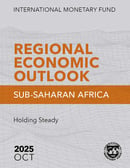This web page provides information in on the activities of the Office, views of the IMF staff, and the relations between Niger and the IMF. Additional information can be found on Niger and IMF country page, including official IMF reports and Executive Board documents in English and French that deal with Niger.
At a Glance
- Current IMF membership: 191 countries
- Niger joined the Fund on April 24, 1963.
- Total Quotas: SDR 131.6 Million
- Outstanding purchases and loans: SDR 345.18 Million (As of June 30, 2024)
- Link to 2022 Article IV Country report. (Country Report No. 2023/028, January 18, 2023)
News and Highlights
Regional Economic Outlook Presentation
Mr. Rasmane Ouedraogo, Resident Representative, presented the latest April 2023 REO to the Minister of Finance, Ambassadors, trade unions, journalists and university students. (French version only)
June 9, 2023
2021-november-niger-reo-outreach (français)
November 26, 2021
Niger and the IMF
No results found. Either there was an error with the web service or there is no data returned by the web service.
Regional Economic Outlook for Sub-Saharan Africa
October 16, 2025

The outlook for Sub-Saharan Africa is showing resilience, despite a challenging external environment with uneven prospects in commodity prices, still tight borrowing conditions, and a deterioration of the global trade and aid landscape.
Read the Report
Fraudulent Scam Emails Using the Name of the IMF
For more information please see Fraudulent Scam Emails Using the Name of the IMF
Departmental Papers on Africa
 The Departmental African Paper Series covers research on sub-Saharan Africa conducted by International Monetary Fund (IMF) staff, particularly on issues of broad regional or cross-country interest. The views expressed in these papers are those of the author(s) and do not necessarily represent the views of the IMF, its Executive Board, or IMF Management.
The Departmental African Paper Series covers research on sub-Saharan Africa conducted by International Monetary Fund (IMF) staff, particularly on issues of broad regional or cross-country interest. The views expressed in these papers are those of the author(s) and do not necessarily represent the views of the IMF, its Executive Board, or IMF Management.



